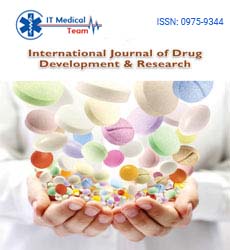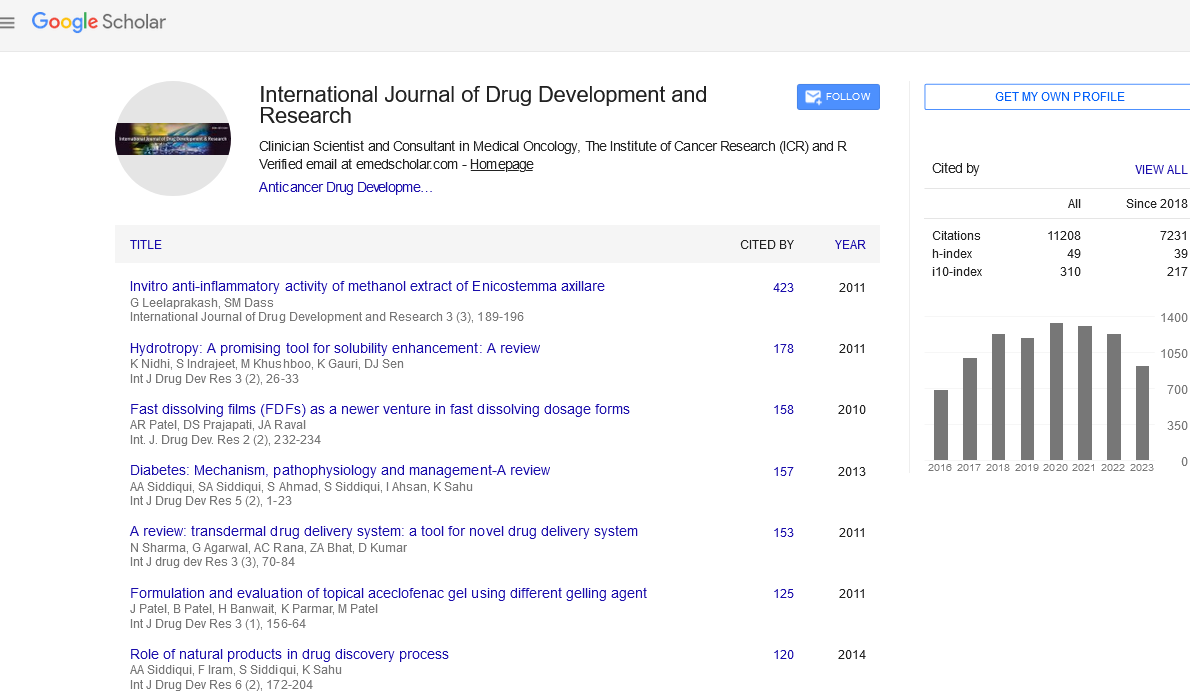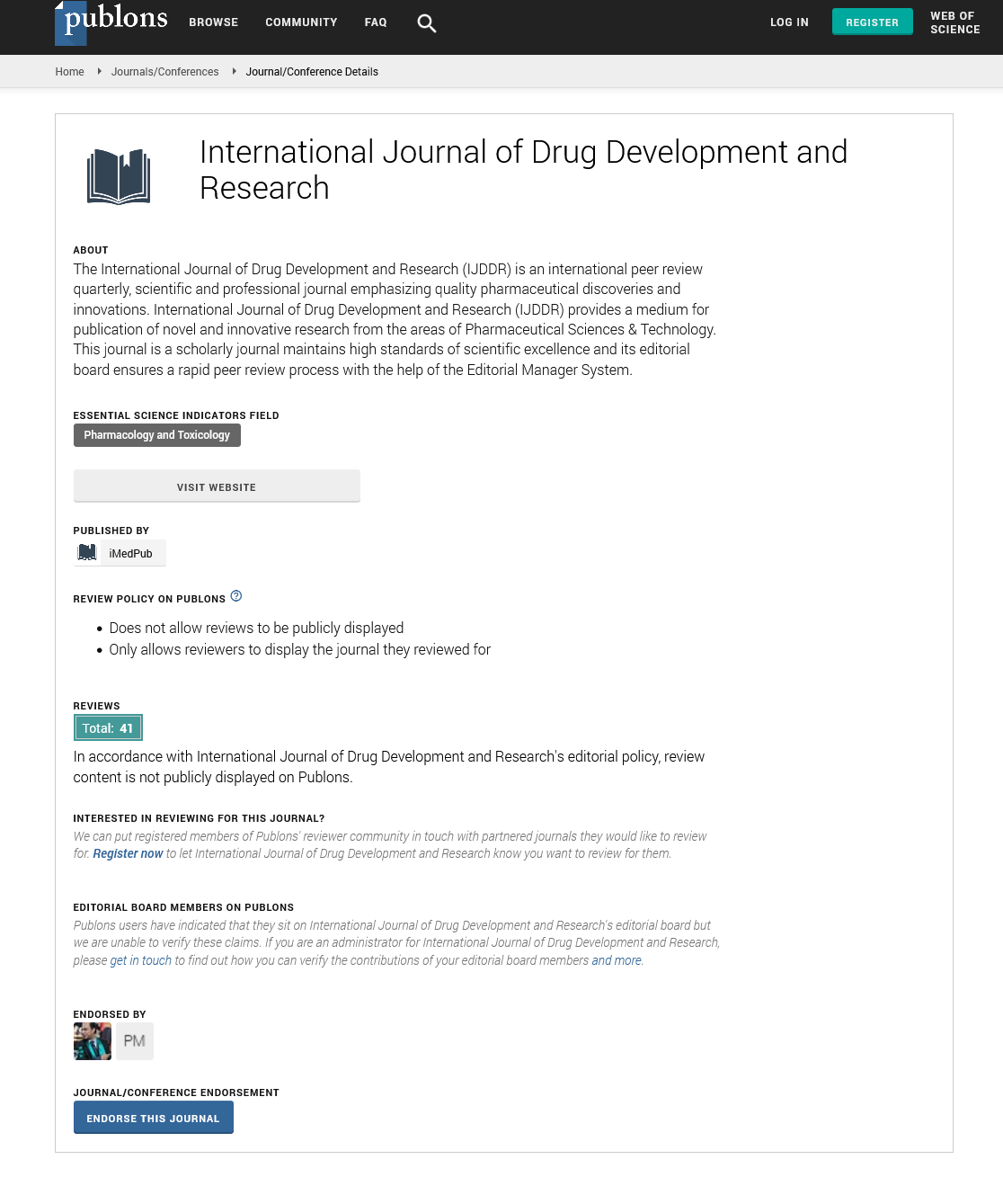Perspective - (2023) Volume 15, Issue 6
Harnessing nature's bounty: Exploring the effects of medicinal plants on the cardiovascular system
Yoshka Koki*
Department of of Natural Products, University of Limoges, Limoges, Japan
*Correspondence:
Yoshka Koki, Department of of Natural Products, University of Limoges, Limoges,
Japan,
Email:
Received: 01-Nov-2023, Manuscript No. ijddr-23-14313;
Editor assigned: 03-Nov-2023, Pre QC No. P-14313;
Reviewed: 17-Nov-2023, QC No. Q-14313;
Revised: 24-Nov-2023, Manuscript No. R-14313;
Published:
04-Dec-2023
Introduction
The quest for effective and holistic healthcare has led
researchers to explore the vast realm of medicinal plants,
seeking remedies deeply rooted in nature. Among the
myriad health benefits attributed to these botanical
wonders, their impact on the cardiovascular system stands
out prominently. This article delves into the fascinating
world of medicinal plants and their profound effects on
the cardiovascular system, shedding light on both historical
uses and contemporary scientific findings.
Description
Historical perspectives
Throughout history, diverse cultures have relied on
medicinal plants to address a variety of ailments, including
cardiovascular issues. Traditional systems of medicine, such
as Ayurveda in India and traditional Chinese medicine,
have long recognized the therapeutic potential of plants
in maintaining heart health. For instance, garlic (Allium
sativum) has been a staple in traditional medicine for
centuries, believed to possess cardiovascular benefits.
Impact on blood pressure
One of the primary concerns in cardiovascular health
is maintaining optimal blood pressure levels. Several
medicinal plants have demonstrated antihypertensive
properties, offering natural alternatives to conventional
medications. Hibiscus sabdariffa, commonly known as
hibiscus, has garnered attention for its potential to lower
blood pressure. Studies suggest that compounds in hibiscus
may act as vasodilators, relaxing blood vessels and reducing
the strain on the heart.
Similarly, the leaves of the olive tree (Olea europaea) have
been investigated for their antihypertensive effects. Olive
leaf extract is thought to improve blood vessel function
and contribute to the regulation of blood pressure. By
embracing these natural alternatives, individuals may find
additional support in managing hypertension alongside
lifestyle modifications.
Cholesterol regulation
Medicinal plants also play a crucial role in regulating
cholesterol levels, a key factor in cardiovascular health.
The red yeast rice (Monascus purpureus) is one such plant that has been traditionally used in Chinese medicine. It
contains compounds known as monacolins, which are
similar to statins, a class of drugs commonly prescribed to
lower cholesterol levels. Red yeast rice has shown promise
in reducing Low-Density Lipoprotein (LDL) cholesterol,
often referred to as "bad" cholesterol.
Turmeric (Curcuma longa), a vibrant yellow spice with a
rich history in traditional medicine, contains the active
compound curcumin. Research suggests that curcumin
may have lipid lowering effects, contributing to the
management of cholesterol levels. Including turmeric
in the diet or taking curcumin supplements may offer a
natural approach to supporting cardiovascular health.
Antioxidant defense
The cardiovascular system is susceptible to oxidative
stress, a condition characterized by an imbalance between
free radicals and antioxidants. Medicinal plants, rich in
bioactive compounds, often exhibit potent antioxidant
properties that can counteract oxidative damage. Green
tea (Camellia sinensis), for example, contains catechins,
which have been shown to have antioxidant and anti-inflammatory
effects. Regular consumption of green tea
may contribute to cardiovascular protection by reducing
oxidative stress.
Additionally, Ginkgo biloba, an ancient tree species,
is renowned for its antioxidant properties. Ginkgo
extracts are believed to scavenge free radicals, protecting
the delicate cells lining blood vessels and supporting
overall cardiovascular health. The incorporation of these
antioxidant-rich plants into dietary habits or as supplements
may serve as a preventive measure against oxidative stress-related
cardiovascular issues.
Anti-inflammatory effects
Chronic inflammation is increasingly recognized as a
contributing factor to cardiovascular diseases. Medicinal
plants with anti-inflammatory properties may offer a
natural means of addressing inflammation and promoting
heart health. The Mediterranean herb rosemary (Rosmarinus
officinalis) has compounds like rosmarinic acid, known
for their anti-inflammatory effects. By mitigating
inflammation, rosemary may contribute to the prevention
of cardiovascular diseases.
Another potent anti-inflammatory agent is ginger (Zingiber
officinale). Ginger contains bioactive compounds, such
as gingerol, which have demonstrated anti-inflammatory
effects in various studies. Integrating ginger into the
diet or using it as a supplement may be a flavorful and
natural way to support cardiovascular health by addressing
inflammatory processes.
Endothelial function improvement
The endothelium, a thin layer of cells lining blood vessels,
plays a crucial role in cardiovascular health. Dysfunction of
the endothelium is associated with various cardiovascular
conditions. Certain medicinal plants have been investigated
for their potential to improve endothelial function. One
such plant is beetroot (Beta vulgaris), rich in nitrates that the
body converts into nitric oxide. Nitric oxide is a signalling
molecule that helps relax blood vessels, contributing to
improved endothelial function and blood flow.
Conclusion
The exploration of medicinal plants and their effects on
the cardiovascular system reveals a rich tapestry of natural
remedies that have been utilized across cultures for
centuries. From blood pressure regulation to cholesterol
management, antioxidant defense, anti-inflammatory
effects, and endothelial function improvement, these plants
offer a holistic approach to heart health.
While medicinal plants show promise in supporting
cardiovascular well-being, it is essential to approach their
use with caution and under the guidance of healthcare
professionals, especially for individuals with pre-existing
conditions or those taking medications. Integrating these
botanical wonders into a balanced and healthy lifestyle may
unlock the full potential of nature's pharmacy in promoting
cardiovascular health. As science continues to unravel the
complexities of plant-based medicine, the synergy between
tradition and modern research holds the key to a heart-healthy
future.






